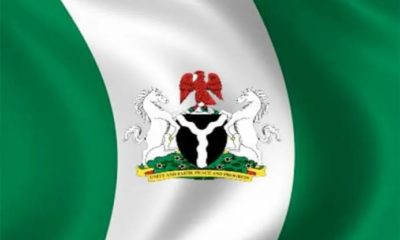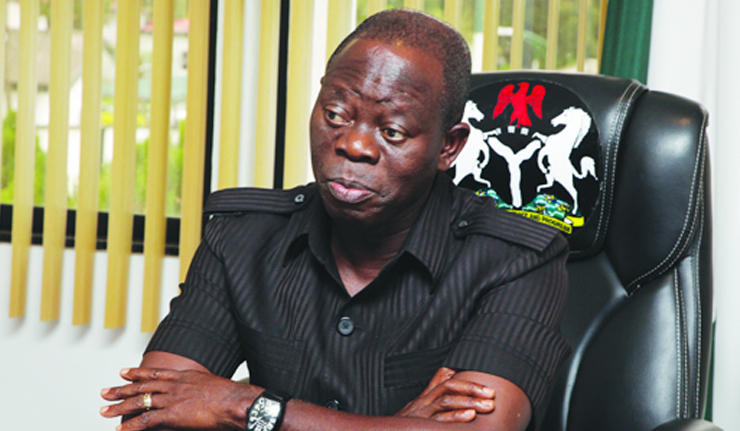Finance
ECA drops to $2.45bn as FG, states share N580bn

-The Excess Crude Account has been further depleted by about $650m from the $3.1bn in December to $2.45bn as of January 16, figures obtained from the Federation Account Allocation Committee has revealed.
The Minister of State for Finance, Amb. Bashir Yuguda, gave the figure while addressing journalists at the end of this month’s FAAC meeting in Abuja
Also at the meeting, the committee shared the sum of N580.37bn among the three tiers of government as allocation for the month of December.
The December allocation of N580.37bn is N108.56bn lower than the budgeted amount of N688.93bn and N12.85bn less than the N628.77bn shared in November.
Yuguda said that the shared amount comprised statutory revenue of N474.4bn, and N6.3bn being debt repayment made by the Nigerian National Petroleum Corporation.
Other components of the allocation, according to him, are Value Added Tax of N73.5bn, and an additional N15.6bn from the ECA was released to augment shortfall in revenue generated during the period.
Giving a breakdown of revenue among the three tiers of government, Yuguda said the Federal Government received N220.5bn representing 52.68 per cent; states, N111.8bn, representing 26.72 per cent while the local governments got N86.2bn or 20.60 per cent of the amount distributed.
He also disclosed that N47.2bn, representing 13 per cent derivation revenue was shared among the oil producing states.
The minister put the gross revenue received for the month of December at N490.03bn, noting that the amount was lower than the N500.07bn received in the previous month by N10.04bn.
Yuguda said a 12 per cent drop in crude oil prices between the month of October and November last year had a negative effect on revenue accretion to the federation account.
He said, “A 12 per cent drop in crude oil from $87.8m in October to $77.5m in November lead to a $62.8m loss in revenue.
“Also in volume, a 52 per cent loss was recorded coupled with a 31 per cent drop in a revenue generated by LPG and NGL all contributed negatively to the federation’s equity.
“The persistence of the force majeure declared by Shell since June, 2014 and the shutting of trucks and pipelines at various terminals also impacted negatively on the revenue performance.
“Also, non-oil revenue dipped due partly to the fact that the timeline for the payment of taxes by many companies is yet to fall due.”
The Chairman, FAAC Finance Commissioners’ Forum, Mr. Timothy Odah, who also spoke to journalists at the end of the meeting, expressed concern over the continued decline in revenue to the federation account.
He called for a more diversification efforts by all levels of government to ensure that the drop in oil price does not affect the programmes of the government.
Odah said state governments had to evolve new strategies to survive and stop the dependence on oil, advising that there was need for a wage review for political office holders and their appointees to save more money to meet other demands.
Business
Nigeria pays US$4.9 billion on petrol subsidy in 2024- NNPCL
It was however noted by Biztellers.com.ng, that although subsidy is back in effect, the main reason for that is the increasingly weak state of the Naira and the country’s extreme dependence on products importation. Also unlike the previous subsidy era, where several oil marketers were getting free subsidy refunds for unverified product importation, this subsidy era is witnessing only one importer, the NNPCL, which in effect is the sole receiver of government subsidies.
Yemie ADEOYE
INSPITE of the official position of the Nigerian government that the controversial petrol subsidy is gone for good as announced by the President on assumption of office, the state owned Nigerian National Petroleum Corporation Limited, NNPCL has disclosed that petrol subsidy is still fully operational in Nigeria, although, under a different identity.
Umar Ajiya, Chief Financial Officer at the NNPCL, disclosed that it cost the company a staggering N7.8 trillion (US$4.9) to cover this price gap in the first seven months of 2024.
Rather than simply referring to these claims as subsidies, he stated that the company is merely managing the price difference in petrol imports on behalf of the federation, stressing that this should not be misconstrued as a return to subsidy payments.
![]() This revelation has reignited discussions on whether the NNPC is indirectly offering subsidies, a concept typically defined as selling a product below its cost price.
This revelation has reignited discussions on whether the NNPC is indirectly offering subsidies, a concept typically defined as selling a product below its cost price.
Documents reviewed by Biztellers.com.ng showed that the term “subsidy” was used extensively in official correspondence between the NNPCL and the presidency, particularly in reference to the “shortfall.”
Recall that President Bola Tinubu reportedly approved NNPC’s request to utilize the 2023 final dividends due to the federation to offset these costs.
However, during a media briefing on Monday about the company’s 2023 audited financial statements, Ajiya refuted claims that the NNPC is involved in any subsidy scheme.
Ajiya further disclosed that the Nigerian government owes the NNPC N7.8 trillion ($4.9 billion) in subsidy-related debts for the period from January to July 2024.
In furtherance of his clarification to the News Agency of Nigeria (NAN), Ajiya insisted that no subsidy payments have been made to any marketer in the last nine years, citing the NNPC’s role as the sole importer of petrol under supply contracts.
He said, “In the last eight to nine years, NNPC Ltd. has not paid anyone a dime as a subsidy; no kobo has been disbursed by NNPC Ltd. in the name of subsidy. No marketer has received any payment from us for subsidy.”
“What has been happening is that we have been importing PMS, which has been landing at a specific cost price, and the government tells us to sell it at half price. So the difference between the landing price and that half price is a shortfall.
“And the deal is between the Federation and NNPC Ltd., to reconcile, sometimes they give us money, so there is no money exchanging hands with any marketer in the name of subsidy.”
Ajiya remained silent on how much of the $4.9 billion could have been remitted to the federation account if the NNPC had not been covering the “shortfall.”
It was however noted by Biztellers.com.ng, that although subsidy is back in effect, the main reason for that is the increasingly weak state of the Naira and the country’s extreme dependence on products importation. Also unlike the previous subsidy era, where several oil marketers were getting free subsidy refunds for unverified product importation, this subsidy era is witnessing only one importer, the NNPCL, which in effect is the sole receiver of government subsidies.
Banking
CBN Denies Currency Devaluation

The Central Bank of Nigeria (CBN) has refuted claims of devaluing the.
Earlier reports suggested that the CBN had devalued the Naira, lowering its exchange rate from N631 to the dollar, compared to the previous day’s rate of N461.60 at the Importers and Exporters (I&E) window.
However, the Central Bank of Nigeria (CBN) released a statement on Thursday through its Acting Head of Corporate Communications, Dr. Isa Abdulmumin, categorizing the report as false information.
In the statement titled ‘CBN Has Not Devalued The Naira’, he said the attention of the apex bank was drawn to the news report by an Abuja based newspaper edition of June 1, 2023, titled “CB Devalues Naira To 630/51”.
However, the CBN stated categorically that the news report was replete with outright FALSEHOODS and destabilizing innuendos, ‘reflecting potentially willful ignorance of the said medium as to the workings of the Nigerian Foreign Exchange Market.’
“For the avoidance of doubt, the exchange rate at the Investors’ & Exporters (I&E) window traded this morning (June 1, 2023) at N465/USS1 and has been stable around this rate for a while.
“The public is hereby advised to ignore the news report by Daily Trust in its entirety, as it is speculative and calculated at causing panic in the market,” the CBN spokesman added.
He, therefore, advised media practitioners to verify their facts from the Central Bank of Nigeria before publishing in order not to misinform the public.
Banking
BREAKING: CBN Increases Interest Rate By 0.5%

The interest rate in Nigeria has been raised to 18.5 percent, up by 0.5 percent, from 18 percent where it was pegged in March 2023.
The Central Banks of Nigeria’s (CBN) Monetary Policy Committee (MPC) resolved to this effect at its third meeting of 2023 in Abuja, on Wednesday.
Governor, CBN, Godwin Emefiele, made the disclosure in the communiqué of the MPC’s meeting, thereafter.
While engaging the media at the end of the two-day meeting, Emefiele, said the committee voted to keep the asymmetric corridor at +100 and -700 basis points around the MPR.
In the view of the MPC, rising inflation rate is traceable to the high energy cost and challenges around the supply chain, among others, which lie outside the corridors of the CBN.
Emefiele said, “The current trend in price development would continue to be monitored by the bank with greater collaboration with fiscal authority to address the drivers of inflation.”
Biztellers reports that the CBN had effected six consecutive interest rate increases, which has seen the rate move from 11.5 percent in March 2022 to 18.5 percent in May 2023.





















